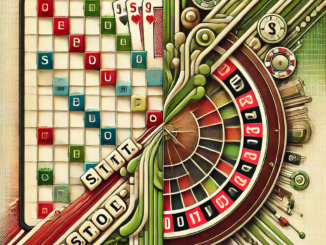Most college students must move between classes, study at night, and ensure they complete their assignments on time. This is the average student’s lifestyle; however, it isn’t ideal. When you work without taking any breaks, your mind and body will suffer from built-up stress. So, it’s essential to pause and engage in other activities occasionally.

There are many fun things to do when trying to relax; one is playing Scrabble. It’s a classic board game that requires strategic thinking and a strong vocabulary, thus making it ideal for students looking to rest from academic workloads while engaging in productive activities. If you are familiar with Scrabble or a soon-to-be player, this article is for you as we review five practical tips to help you improve your skills.
5 Tips to Improve Your Scrabble Skills as a College Student
Scrabble is a fun game to play with many benefits, especially once you understand the rules. However, if you want to take your skill to the next level, here are five tips and tricks to do just that:
- Expand Your Vocabulary
- Learn High-Scoring Words
- Focus on Prefixes and Suffixes
- Practice Your Anagramming Skills
- Play Regularly
1. Expand Your Vocabulary
Scrabble is all about words, so the better you know. There are many ways you can increase your vocabulary. Assuming you don’t want to spend hours reading through a dictionary, you’ll probably want a more pleasant and productive experience like reading a book. Aside from reading, you can also choose to write. For inspiration, you can use these synthesis essay topics to practice. Synthesis topics are common assignments for college students, so you might even find a topic you can use for an essay assignment later.
2. Learn High-Scoring Words
In Scrabble, some words are worth more points than others, so learning them can give you a good advantage toward winning. Examples of such words are “quixotic” (27 points) or “zyzzyva” (41 points). While we have already established it’s essential to know a wide variety of words, it’s equally important to master high-scoring words as well. This can help you maximize your score and potentially win the game. Even if you don’t know many high-scoring words, you can find lists of them online or in strategy books.
3. Focus on Prefixes and Suffixes
Another tip for improving your Scrabble game skills is to focus on prefixes and suffixes. These are parts of words that can change the meaning. They are often used in Scrabble to create new words. For instance, adding the prefix “re-” to “cover” creates the word “recover.” Similarly, adding the suffix “-ness” to “sad” creates the word “sadness.” By learning common prefixes and suffixes, you can increase your options for creating new words on the board and beating your opponents.
4. Practice Your Anagramming Skills
An anagram is a word created by rearranging another word’s worlds. It’s a fantastic concept that has been taught in many educational books like the ones you can find here. They have been used in the past to share secret messages, but in Scrabble, they are a valuable skill that can help you easily create words. You can use online tools such as Anagrammer or Scrabble Word Finder to help you generate words.
5. Play Regularly
Finally, if you want to get better at anything, you need to take out the time to practice. This is true for Scrabble players as it would allow you to understand the rules faster and develop your own strategies from playing experience. You can play with friends or join a Scrabble club on campus when looking for some game time.
In Conclusion
Scrabble is a fun and engaging game to play. It improves your vocabulary and creates opportunities to meet like-minded individuals. Following the tips in this article, you should see your Scrabble skills improve with time.
Author’s Bio
William Fontes is a writer and competitive Scrabble player. He learned all he knows from watching the best play online and has since developed his own winning strategies. William appreciates Scrabble’s many benefits and is always looking for opportunities to get more people interested.



Be the first to comment